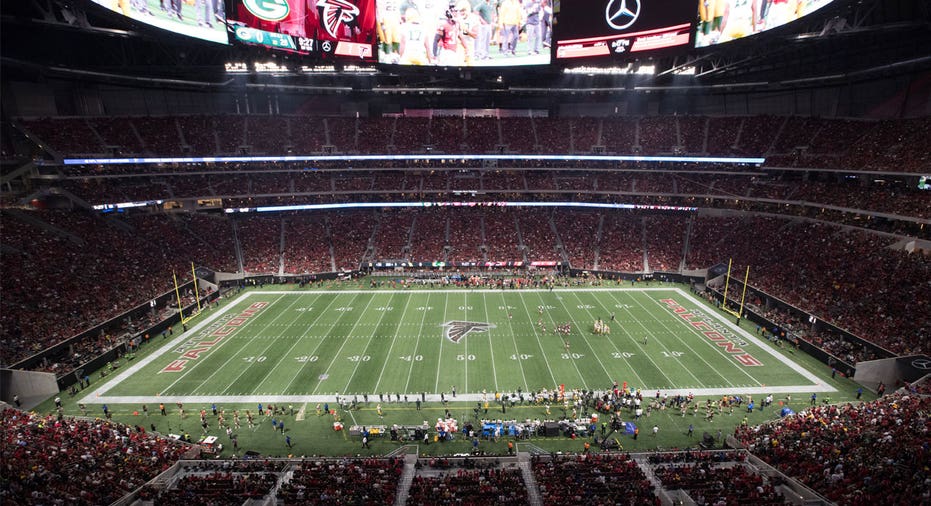NFL spends massive amounts of taxpayer cash on new stadiums

The National Football League’s Oakland Raiders are looking into constructing a brand new $1.3 billion stadium near the Las Vegas strip and, like other NFL franchises have in the past, it is counting on using massive amounts of taxpayer money to do so.
The proposed Raiders stadium is expected to be partly funded by the largest taxpayer subsidy in the history of the NFL, of $750 million, according to The San Diego Tribune.
The League, which is expected to rake in $14 billion this season according to Sports Business Daily, received nearly $7 billion from taxpayers to construct stadiums over the last two decades, according to the Taxpayers Protection Alliance, as reported by The Huffington Post. That includes $444 million to the Dallas Cowboys, more than $600 million to the Indianapolis Colts and $424 million to the Cincinnati Bengals.
Meanwhile, the NFL continues to build new and more expensive venues. The Minnesota Vikings just moved into a new $1.1 billion stadium, for which the state is on the hook for $348 million and the city for $150 million, according to local news outlets. Additionally, the Atlanta Falcons recently began competing in Mercedes-Benz Stadium, which cost $1.6 billion and $200 million of the construction cost came from bonds backed by Atlanta hotel-motel taxes.
So how do NFL teams get taxpayers to cough up the cash? One sports economist told FOX Business that they tend to over-exaggerate the team’s benefit to the local economy and use that as leverage.
“The big thing they do is limit the number of franchises and use the threat of relocation (either to another metropolitan area or to another location within an existing metro area) to extort handouts from taxpayers,” Victor Matheson, sports economist at Holy Cross, told FOX Business. “Faced with the possibility of losing a team, taxpayers give in to the extortion.”
In addition to this type of “extortion,” NFL franchises may also seek to exploit what seem like loopholes in the tax code, Matheson said. One way they do this is by registering the stadium as government-owned, when in reality it is fully owned and operated by the team so the franchise keeps all of the profits, avoids property taxes and some income taxes.
Another study from The Brookings Institution says the NFL receives taxpayer dollars in the form of tax-exempt municipal bonds. This is a government tool designed for public infrastructure projects, Michael Sargent, a policy analyst at the Heritage Foundation, told FOX Business. For all 36 NFL, NHL, NBA or MLB venues that were constructed or majorly renovated using federal bonds for partial funding between the year 2000 and Sept. 2016, the total tax-exempt bond principal issued to fund these stadiums was approximately $13 billion. But while this is "free money" for the NFL, Sargent said taxpayers are utlimately on the hook for the Treasury's lost revenues that the league claims exemption from.
Matheson also recalled one example where the Chicago Bears were not expected to win a vote to rebuild their stadium, so instead tore the entire thing down except for a strip of Greek columns, allowing the team to label the rebuild as a remodel instead, bypassing a public vote.
There are conflicting opinions about whether taxpayers ultimately reap the benefits from having an NFL franchise in their city, though it is clear through the bidding process that cities do want them. Matheson said local neighborhoods might benefit from increased economic activity, but the “evidence is quite clear that NFL teams and stadiums do not increase economic activity at a city-wide level.”
The NFL is currently enrapt in the center of a national debate about its players taking a knee during the national anthem. President Donald Trump has chimed into the debate, saying in an interview with Fox & Friends on Thursday that the league’s owners are “afraid” to take action against their players.
“The NFL is in a box and they have to do something about it,” Trump told Fox News, in the interview aired Thursday morning. “I think they’re afraid of their players, if you want to know the truth.”
The NFL did not return FOX Business’ request for comment at the time of publication.



















